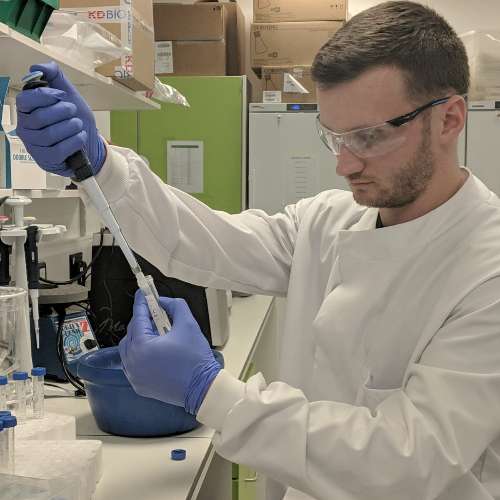Christopher Smith graduated with an MSc Biotechnology and Bioengineering in 2018. He is now working as a Research Associate at Evox Therapeutics
Why did you choose to study the MSc Biotechnology and Bioengineering at Kent?
I was previously working in the healthcare field as a clinician, but I wanted to transition into research work. As I had little practical lab experience I was seeking a course that would enable me to develop my practical skills as well as my all-round research skills. I was drawn to the MSc Biotechnology and Bioengineering at Kent since the course offered a broad range of topics in the form of both practical lab work and taught lectures and seminars. I was also impressed by the range of cutting-edge technology that the School of Biosciences had in order to conduct research. Also, I am originally a Kent local and knew several former Kent students who all spoke highly of the University and the School.
What modules or aspects of the MSc did you find the most rewarding and/or interesting?
As part of the course we undertook a lab project working with CRISPR/Cas9 technology, which for me was a particularly interesting aspect of the course. This technology has gained a lot of public interest in the last few years for its potential to revolutionise how we treat genetic diseases. The final research project was also a major highlight for me since it was a chance to put all the skills I had learned over the year into practice in a true research setting, as well as to learn new skills and techniques. To investigate something, no matter how small, that had not been investigated before was exciting.
What did you think of the teaching at Kent?
The teaching at Kent was very high quality, we received lectures and lab sessions from many different professors and lecturers all with different backgrounds and expertise in their respective fields. The practical sessions were a great opportunity to receive guidance and advice from PhD students and researchers all of whom had a wealth of knowledge. Outside of the scheduled time all the lecturers were very supportive and willing to help answer questions, or to just have a friendly chat.
Did you get to do research as part of your degree?
Yes. As part of the Research project in the Summer term I was in the lab each day amongst professors, post-docs and current PhD students. This set-up was not only helpful, informative and interesting but it was also a lot of fun. It helped put the skills I had learned earlier in the year into real practice but also accelerated my learning in a number of other techniques whilst further advancing my general research skills.
What skills have you gained during your studies? How do you think your studies at Kent affect your career prospects?
I gained a wide range of skills that have all been relevant to the role I have now. Almost all of the practical lab skills we learnt I now use on a day to day basis. Aside from these I think some of the key skills I developed were planning and project management, and tied into this the ability to be flexible and to strategize and problem solve when projects are not going to plan. These are all very important skills in research.
What does your current role at Evox Therapeutics involve?
At Evox Therapeutics we are working on developing new exosome-based treatments for some rare and severe genetic diseases. My role within the company is a Research Associate within the RNA team. I work with a team of researchers on helping to develop technologies which will enable us to use exosomes to deliver therapeutic RNA molecules to targets that are currently unreachable by current drug technologies.
The area of research I work in is a relatively new field but is growing in interest and is showing great potential to revolutionise treatments for diseases that currently have poor treatment options or no options at all! It is a very exciting time to be involved in this field and Evox are one of the pioneering companies of this technology. I hope to continue to develop my skills within the company whilst contributing to this goal.
What advice do you have for students considering this programme?
As a postgraduate student, you have to take responsibility for your learning, so this includes managing your time, being inquisitive and reading around the subject area. It might sound like a cliché but you really will get out what you put in. The facilities and teaching at Kent are excellent, but it is important to be inquisitive and make the most of the opportunities that Kent will provide. Be disciplined and manage your time well, but also make sure you have fun and enjoy yourself, I guarantee you will learn more this way.

